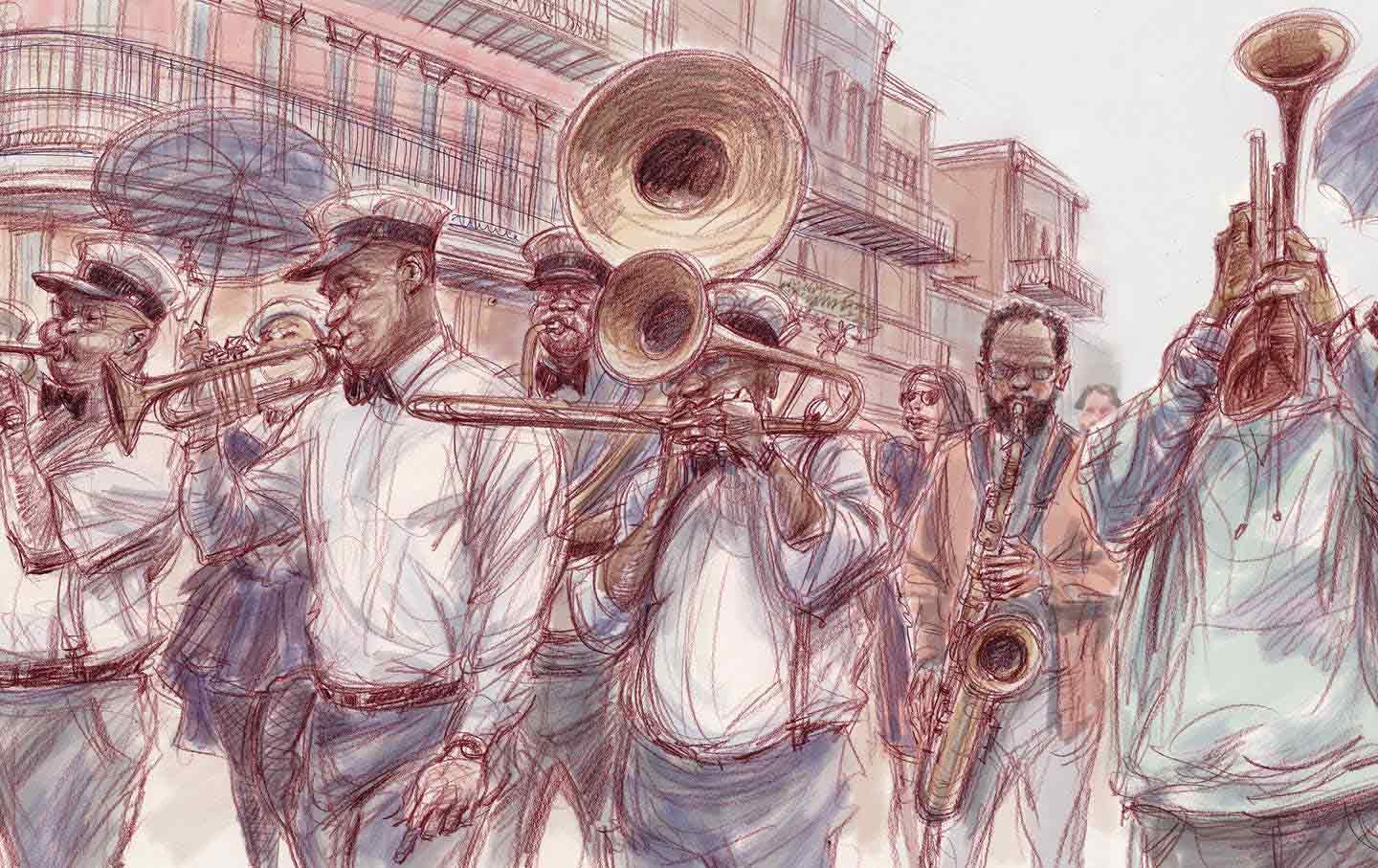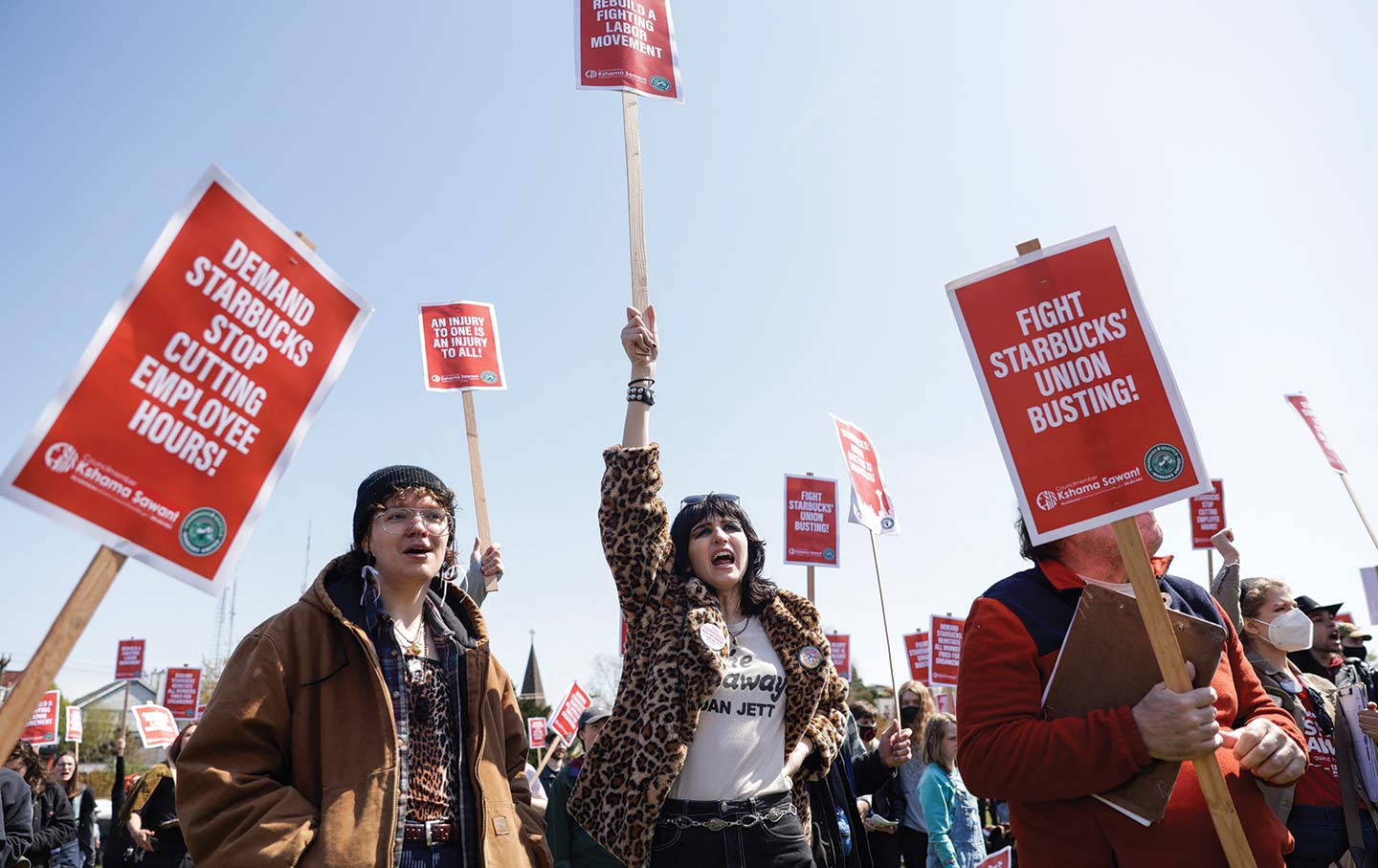Survivor Justice and Democracy: A Conversation With Kylie Cheung
The Nation spoke with the journalist and author about the ways in which domestic violence and the ongoing attacks on bodily autonomy impede the democratic process.

In her new book Survivor Injustice, the journalist Kylie Cheung links attacks on abortion rights with domestic violence and voter suppression to show how the state not only enables abusers to inflict harm and violence but often functions as an abuser itself. Cheung spoke with The Nation about the ways in which domestic violence and the ongoing attacks on bodily autonomy impede the democratic process; the pitfalls of relying on the state to end gender-based violence; and what survivor justice might look like. This interview has been edited for clarity.
—Victoria Law
Victoria Law: What prompted you to write this book?
Kylie Cheung: I started writing in 2020 amid the Covid-19 pandemic. I was initially inspired by the surge in reported rates of domestic violence that we were seeing at that time, which coincided with the presidential election.
It began as a project to help understand domestic violence as an underexplored form of voter suppression. Then, amid all of the very intense developments throughout that year, including the conversations about abolition and policing, and the impacts of our fundamentally racist policing system on survivors as well, it expanded into a much broader exploration of survivor injustice.
Much of the book was written even before the overturning of Roe last summer, but all of this reproductive oppression was really building toward that outcome.
What I’m really trying to underscore is how state violence creates the conditions for gender-based interpersonal violence. The policies that deny people the resources that they need to live and thrive and that imprison or entrap abuse victims in cycles of poverty, such as policies forcing people to stay with abusive partners for health care or shelter, also force people to remain pregnant against their will.
VL: Can you talk more about the connections between domestic violence and restrictions and prohibitions on abortion?
KC: Reproductive coercion is any kind of attempt by an abusive partner to control someone’s reproductive decision making. An abortion ban is a form of gender-based violence and, I would argue, a form of rape, in that the government is invading a pregnant person’s body in that manner. It’s state endorsement of interpersonal reproductive coercion. When these are our laws, they affirm that it’s okay to control your family members’ reproductive decision making.
In the year since Roe has been overturned, the National Domestic Violence Hotline has said it’s received a 99 percent increase in calls about reproductive coercion. Homicide is a leading cause of death for pregnant people, often by intimate partners. In the last few months we’ve seen: a Texas woman shot and killed by her partner for having an abortion when he didn’t want her to; a man in Missouri who was sentenced to life in prison for killing his pregnant wife who had Googled, “What to do if you’re pregnant and your partner doesn’t want you to be?” One of the stories that happened post Dobbs was a 10-year-old Ohio rape victim forced to travel across state lines to access care.
VL: We have a contentious election coming in 2024. How do all of these restrictions we’re seeing—on voting and bodily autonomy, as well as cuts to domestic violence services—affect a survivor’s ability to participate in democracy?
KC: It’s not always immediately and directly clear how abortion bans and attacks on people’s bodily autonomy and reproductive freedom do impact democracy, but there’s absolutely a connection. The state violence that we’re seeing in terms of abortion access gaps increases the vulnerability of pregnant people and people who can become pregnant to domestic violence. It makes it more likely that people who might be forced to carry an unwanted pregnancy are going to be in trapped in a long-term abusive situation, which impacts their socioeconomic standing and their ability to participate in public life. When they remain entrapped in an abusive situation, it has significant impacts on their voting rights. Domestic violence does impact people’s access to those rights.
VL: Most people don’t think about domestic violence as a form of voter suppression. Tell me more about how you made that connection.
KC: I spoke to several people who had experiences with a partner coercing them to vote a certain way or a partner blocking them from voting, going to community events, or accessing political information. During the pandemic, abusive partners could take advantage of the mail-in ballot options or take advantage of people not being able to leave their house. Even before the pandemic, all those things had been happening; now they are continuing to happen.
Usually when people are in abusive situations, it can be hard to recognize certain acts—like financial abuse, reproductive coercion, or emotional abuse—as abusive when they’re not overtly physical. It wasn’t immediately clear to some of the people whom I spoke to that interfering with their access to democracy and to voting were acts of abuse. We’ve certainly recognized the ways that voter suppression is often very targeted at communities of color. At thesame time, abuse presents a form of voter suppression that we don’t have a lot of information, or consciousness, about.
VL: You call the Electoral College another weaponized tool against survivors. Why?
KC: When we talk about state violence, we often understand it as viral videos capturing acts of police brutality. What I really want to underscore is that state violence is denying people the fundamental rights and resources that we need to live and to thrive.
The Electoral College is baked into our governing system to prevent a lot of meaningful change. What we’ve seen as a result of this archaic system of government is that we are often living under unpopular policies that are enacting violence upon us. When you look at the Supreme Court, the majority of the justices who are sitting there are people who were appointed by presidents who lost the popular vote. We have presidents who have won without the popular vote and used their executive powers to enact policies that are overwhelmingly harmful to pregnant people and survivors. This governing system that denies us any agency or power to change our material conditions directly feeds and worsens cases of gender-based violence and domestic violence.
VL: You chapter “The Culture War” starts with Johnny Depp’s defamation suit against Amber Heard. What are we seeing in terms of cultural depictions (and backlash) against survivors?
KC: On the surface, that trial involved two wealthy celebrities, but what is really important are the serious ramifications for all survivors through its popularization of rape myths and the most common tactics of abusers. Its ramification on survivors with the least resources, and the most marginalized survivors, is incredibly concerning. It also popularized DARVO, or the tactic of “deny, attack, reverse victim & offender.”
We live in a society where public literacy around the complexities of domestic violence is very poor. That’s to the advantage of abusers, who are able to weaponize that lack of knowledge and that base cultural instinct to see women who say that they were harmed by men as liars. The trial really popularized the completely false idea of mutual abuse, which frames any of the victim’s responses to or acts of self-defense in the face of abuse as abuse itself. Actual domestic violence experts have completely discredited this, but it is one of the most pernicious possible forms of victim blaming insofar as it can make anyone’s response to the abuse that they’re facing into abuse.
VL: The book is called Survivor Injustice. What would survivor justice look like?
KC: I drew a lot of inspiration from Alexandra Brodsky’s incredible book Sexual Justice, which lays out ways to move away from the criminal system as the default medium for addressing sexual harm. Civil suits can sometimes be a more comfortable option for victims and one with a lower evidentiary threshold than criminal cases.
Churches, employers, and campuses can offer processes to address sexual misconduct in a more timely or transparent manner that aren’t available in the criminal system. These can still fall short or be harmful, but they should be part of the broader conversation about increasing the options available to survivors.
Survivor Injustice also lays out approaches rooted in restorative and transformative justice. Restorative justice centers the victim and their community, pushing offenders to take responsibility for their actions and to understand the harm they’ve caused. It prioritizes repairing the harm for the victim and the community.
Transformative justice recognizes that systemic oppression is at the root of all of the forms of harm that we see and aims to address and confront those oppressions at their roots.
Neither approach is about excusing or justifying harm. The highest priority with these processes is moving away from the one-size-fits-all solutions for gender-based violence in the criminal system that often leaves victims re-traumatized and does not center them at all.
VL: What are concrete steps that readers can take against these forms of state-sanctioned abuse?
KC: Educate yourself and share this information. Different advocacy groups have guides. When it comes to pregnancy, know your rights and how to protect yourself.
There are a lot of really great local groups, including local abortion funds, bail funds, and incredible groups like Survived and Punished, which have different regional chapters that help support individuals who have been incarcerated after surviving violence.
Where we can create the most change is at the local level. It can also be an incredible way to build community and learn more about the powers that you might not know you have.
Disobey authoritarians, support The Nation
Over the past year you’ve read Nation writers like Elie Mystal, Kaveh Akbar, John Nichols, Joan Walsh, Bryce Covert, Dave Zirin, Jeet Heer, Michael T. Klare, Katha Pollitt, Amy Littlefield, Gregg Gonsalves, and Sasha Abramsky take on the Trump family’s corruption, set the record straight about Robert F. Kennedy Jr.’s catastrophic Make America Healthy Again movement, survey the fallout and human cost of the DOGE wrecking ball, anticipate the Supreme Court’s dangerous antidemocratic rulings, and amplify successful tactics of resistance on the streets and in Congress.
We publish these stories because when members of our communities are being abducted, household debt is climbing, and AI data centers are causing water and electricity shortages, we have a duty as journalists to do all we can to inform the public.
In 2026, our aim is to do more than ever before—but we need your support to make that happen.
Through December 31, a generous donor will match all donations up to $75,000. That means that your contribution will be doubled, dollar for dollar. If we hit the full match, we’ll be starting 2026 with $150,000 to invest in the stories that impact real people’s lives—the kinds of stories that billionaire-owned, corporate-backed outlets aren’t covering.
With your support, our team will publish major stories that the president and his allies won’t want you to read. We’ll cover the emerging military-tech industrial complex and matters of war, peace, and surveillance, as well as the affordability crisis, hunger, housing, healthcare, the environment, attacks on reproductive rights, and much more. At the same time, we’ll imagine alternatives to Trumpian rule and uplift efforts to create a better world, here and now.
While your gift has twice the impact, I’m asking you to support The Nation with a donation today. You’ll empower the journalists, editors, and fact-checkers best equipped to hold this authoritarian administration to account.
I hope you won’t miss this moment—donate to The Nation today.
Onward,
Katrina vanden Heuvel
Editor and publisher, The Nation








